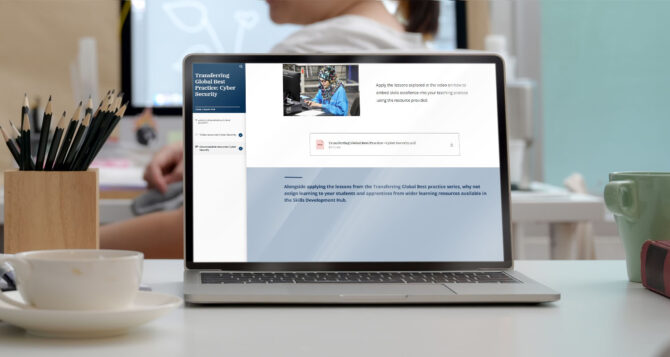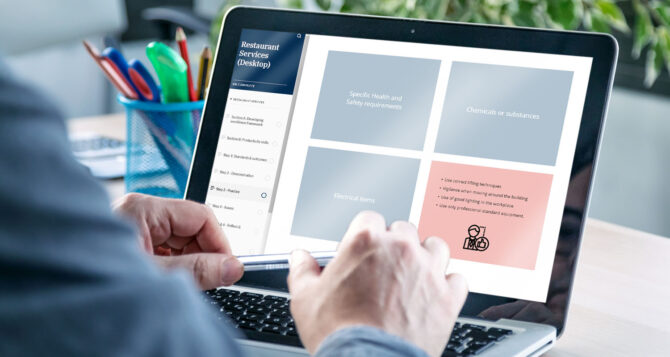WorldSkills UK has created the Skills Development Hub, a package of free, high-quality, interactive digital resources designed to support colleges and independent training providers teaching young people to acquire high-quality skills aligned with international best-practice.
WorldSkills UK’s highly experienced training managers have developed the content with input from their counterparts across the WorldSkills international network, driving best practice standards in teaching and learning across the globe.
The content of the Hub is drawn from best practice exchanges with their counterparts in overseas countries and states in the WorldSkills network of over 80 members. This upgrading of skills helps to inform curricula development and is driving up standards in teaching and learning in all participating territories.
Since its roll-out in December 2020, 400 FE colleges and independent training providers have accessed the Hub, benefitting more than 1,500 young people across the UK.
The Hub has been designed to help educators to develop students and apprentices into a workforce of young people equipped with the highest standards of technical and soft skills including time-management, problem solving, good communication skills, adaptability, commitment and motivation. The combination of these technical and ‘meta’ skills is essential to UK businesses, to enable them to compete successfully in domestic and overseas markets.
Attracting foreign investment is an important part of the government’s levelling up agenda and the availability of high-quality skills is an important factor for international businesses considering a move to the UK, especially in established internationally traded sectors such as engineering, manufacturing and IT.
The WorldSkills UK report produced in partnership with the Learning and Work Institute called, ‘Disconnected, exploring the digital skills gap’ published in March 2021, shows the need for greater emphasis on digital skills development if UK businesses are to be innovative and productive. The report highlights concern that while 60% of businesses say they will rely more on digital skills over the next five years, the number of young people taking IT as a subject at GCSE has fallen by 40% since 2015. To help address these concerns and attract more young people into the digital sphere, WorldSkills UK themed its latest Spotlight Talks, online careers events for young people, to focus on the digital careers opportunities across a wide range of sectors.
Designed to support and complement existing skills development activities, the Skills Development Hub allows for easy access to seven modules ranging from those for educators’ own development (CPD) to those designed for students to be used in classes or remotely:
Professional development for educators
Coaching learners for high-performance CPD: Developed in partnership with Grey Matters, this short course draws on approaches used by coaches and teachers across high-performance environments to support and enrich teaching practice using a set of mental and behavioural skills. Users explore how psychology contributes to maintaining and enhancing high performance, examining how the skills and attitudes of elite athletes and performers can be developed in students regardless of the skill being learned.

Transferring global best practice CPD: Based on WorldSkills UK’s award-winning Centre of Excellence programme and endorsed by NCFE, these resources focus on the seven-step developing excellence framework; created and used to train learners to perform at the highest levels. Activities include case studies; videos; animations and downloadable resources.
Embedding skills competitions: This module provides educators with useful information, downloadable guides, templates and checklists to support the embedding of competition activities in the classroom and to run inter-departmental and inter-college events. Many colleges use these as a precursor to entering competitors for the WorldSkills UK Competitions which attract over 3,000 entrants each year. They are designed to stretch and challenge participants, getting them to demonstrate a wide range of technical and transferable skills, including time management, reliability, resilience, and performing under pressure which employers are increasingly looking for as essential characteristics of high-performing employees.
Evidence shows that embedding competitions in the classroom benefits both learners and educators. Using them to create a more dynamic curriculum develops coaching skills and improves levels of engagement for everyone, while educators can meet and work closely with colleagues in their field, enhancing their own personal and professional development.
Student-focused resources
Teachers and trainers will find a suite of resources to use with students and apprentices, supporting the development of technical, mindset and employability skills. All these resources have been developed by trainers who are highly experienced in their vocational areas and renowned experts in performance psychology and organisational behaviour.
Mindset masterclasses: Learners develop and use a set of ten skills called the psychological characteristics of developing excellence, that can be applied to cope with challenges such as working under pressure or learning new techniques. Each masterclass offers an introduction with insights from young people and educators across education, industry, sport, music and dance who share their experiences and applied practice. The masterclasses unpack the ten skills and how these can be used to cope in any situation whether at college, work or everyday life. Educators will be able to inspire and empower students and apprentices to take ownership of their own personal and professional development. Students will also be empowered to develop positive attitudes and behaviours and transferable skills.

Technical skills masterclasses: These are designed for students and apprentices working towards a range of technical and vocational specialisms. They support the development of knowledge, skills, and behaviours necessary to carry out complex tasks to high standards of technical competence and quality. Lean principles are used to showcase the importance in improving efficiency, waste management and work organisation. There is support for practical problem-solving and critical reflection on experience, including learning from mistakes.
The technical skills masterclasses consist of more than 23 practical skills challenges across a range of areas from beauty therapy to digital construction through to joinery, to challenge and stretch students, providing them with opportunities to build their confidence and improve their practical skills at their own pace.
Personal and professional development: Learners will discover how to develop their personal, professional and technical skills, enhancing their capacity to perform under pressure and demonstrating those qualities and attributes highly valued by employers.
Key features include videos, animations and activities for learners to interact with. Each module contains four lessons which take up to an hour each to complete.
Create bespoke learning groups
Overall, the Hub gives educators the option to create learner groups to easily allocate specific learning modules to a group of learners or specific students, set deadlines, reminders for completion of the modules and run reports to check individuals’ progress and assessment results. The way the content is structured also enables educators to send messages, organise events and issue email notifications to learners. Each of these tasks can be done in under a minute.
All modules can be delivered face to face or online. By familiarising themselves with the resources, educators can decide which modules can be used for a whole-class session, as homework, or in one-to-one sessions or tutorials. The modules can also be used on a standalone basis, giving the flexibility to analyse and respond to individual learners’ needs.
Students’ progress can be charted to ensure they have completed a module successfully before moving on to the next.
Latest developments
The Hub is more intuitive, accessible and easier to navigate than ever before. A keyboard-accessible navigation guide is also available for users who don’t use a computer mouse. The main dashboard has been redesigned, to aid recognition and speed navigation with colour-coded categories and new icons. There are descriptors added to all dashboards, so both educators and students know exactly where they are on every step of their journey.
Subject to continual development, the Hub remains an inclusive and valuable free-to-access service at the leading edge of teaching practice, supporting educators to enable learners to fulfil their potential.
Easy to access
A fast new two-step registration process allows immediate access to the Hub’s resources. Simply complete the shortened registration form. receive the welcome email for login and password creation. Then you’re free to explore the resources, work through them and share with students.

















Your thoughts